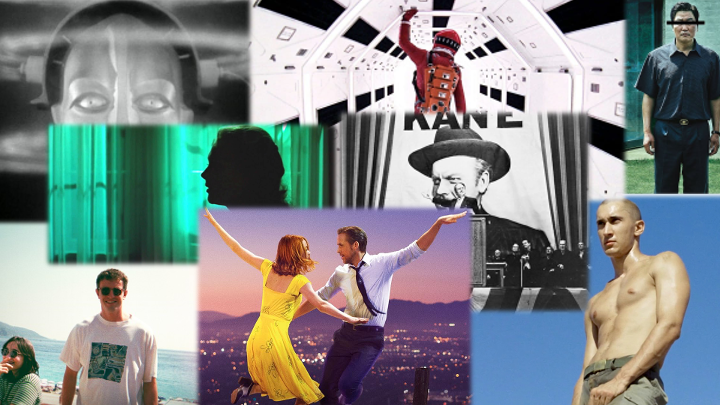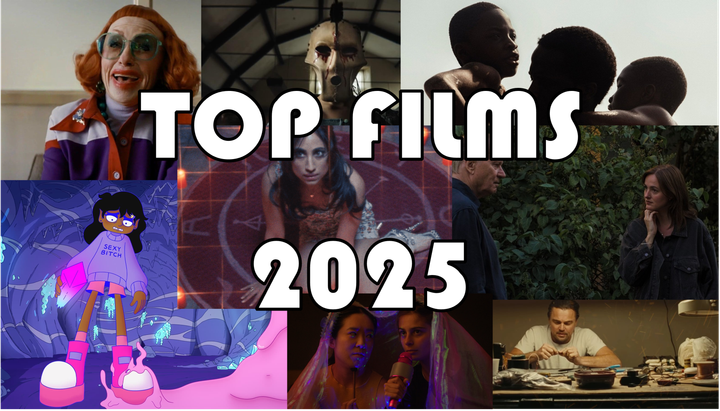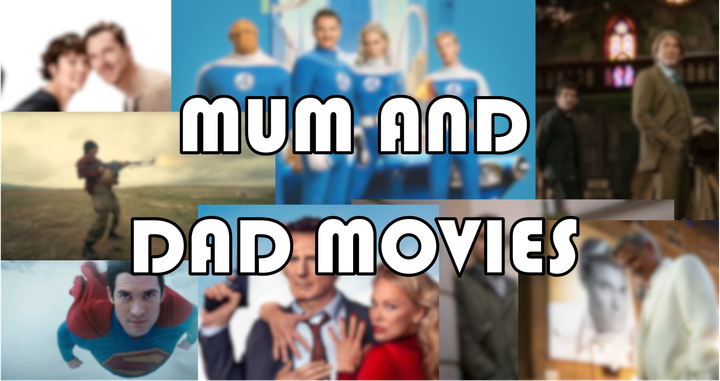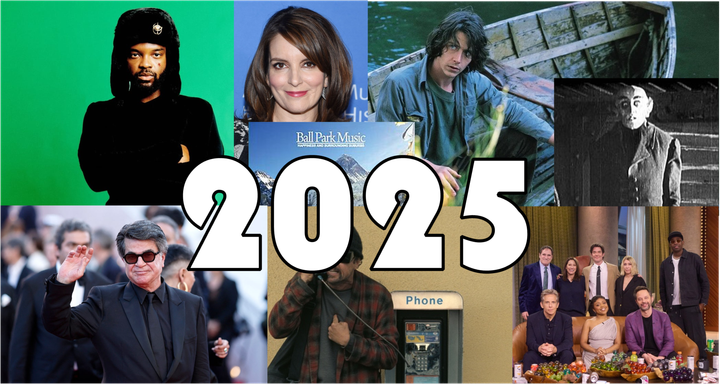In the Pit: Canon Films (according to me and my peers)
Art is subjective but my list is more correct than yours :)

Compiled by Matthew Donlan
Welcome to a bonus Sunday Flea! An irregular detour from your scheduled programming to explore the weird and wonderful side alleys to the film world. This week - the canon.
Last week at film school, we were asked to prepare a list of 10 films we believe should be part of the conversation of greatest of all time. These were then compiled to make a collective cohort canon.1
Before getting into it, I think it’s important to acknowledge why these lists exist in the first place. Discussions around canons aren’t only fodder for heated debates on Twitter, they are a collective attempt to define our values, admirations and goals. The results are a reflection of what we as a society have put importance into. What we have said belongs in the time capsule.
They are also a reflection of power (political, economic, social). But not just the known avenues like ‘old white men from America and Europe’, but the power placed in the list itself. Sight & Sound for example, has, over decades, accumulated power within the film world because of its list. By placing importance into the concept of the list, whatever then appears within it is given that same weight, entrenching it in the psyche and increasing its chances of reappearance in the next list.
What results is a list of 10 films that cinephiles might respect but the average cinema-goer could shrug their shoulders at. A list that can be looked at with admiration or derision. A list that can be labelled as genius or out of touch. All these opinions, like those of the original contributors, are valid, and it is up to you, the discerning viewer, to form your own opinion.
This is the part that I find most interesting about canon lists. I see them as learning opportunities. As a chance to interrogate why and how these films achieved this status. I think that process is more valuable and insightful than the list itself.2
All this is to say my list, like any, is fallible. It is biased and full of my taste. I just hope that you acknowledge that yours is too.
Below you will find my submission, in order, with a short justification.
Below that you will find the cohort’s canon, in order.3

The Fleapit - 10 Canon Films
#10. Do Not Expect Too Much From The End Of The World (2023, Radu Jude)
An ultra-modern essay/collage film, Jude’s feature draws on so many aspects of life and contemporary culture, dissecting all of it in front of our eyes with a bleak sense of humour. It is hyper aware of global discourses and fractious politics yet masterfully condenses it all into a feature. It’s a film I believe should be put in a time capsule for future generations.
#9. The Beast (2023, Bertrand Bonello)
Similar to Radu Jude’s, The Beast is a fascinating blend of fiction and real-world events, contained in a period drama, sci-fi and romance. It has a shell-shattering conclusion that represents so effectively an individual’s battle to create meaning in a technological world. This film, like that of Jude’s is in a discursive practice with the ailments of the modern world.
#8. Aftersun (2022, Charlotte Wells)
Wells uses the full force of imagery, music and storytelling to create an emotionally devastating feature. The structure (a story of an adult battling their inner demons, observed by their child who watches it unfold as an adult) is incredibly powerful, speaking to the transportive and transformative power of film.
#7. Paris Is Burning (1990, Jennie Livingston)
The only documentary in my list, but a strong one at that. Livingston’s film is not only iconic but is an incredibly important film documenting a previously under-represented population. Heartfelt, funny, exhilarating and heartbreaking, this film is full of observations just as relevant today.
#6. La Jetee (1962, Chris Marker)
In such a short run time, Marker invents a style of visual storytelling that takes you to a heartbreaking conclusion. Simple and efficient film making that comes alive at the most astonishing moment.
#5. Beau Travail (1999, Claire Denis)
So yes, this is in the canon, but c’mon. The cinematography and striped-back story telling foregrounds emotions in a powerful way. A female eye to this hyper-masculine context brings a sensuality and poeticism not found elsewhere.
#4. Twin Peaks: The Return (2017, David Lynch)
Controversial I know but bear with me. Lynch’s The Return represents a pinnacle in storytelling amidst a sea of endless reboots, remakes and reruns. It demonstrates how an incredible filmmaker should re-examine their own work, re-contexualise it and deliver a story that fans need, not what they asked for.
#3. The Zone of Interest (2023, Jonathan Glazer)
Inventive and restrictive in its formulation, Glazer’s film indicts the viewer in what is happening just over the wall (i.e. just out of frame). Tackling the most intense of subject matter, it pushes what is possible in film through a haunting sound design and composition.
#2. The Red Shoes (1948, Michael Powell & Emeric Pressburger)
Powell and Pressburger’s Technicolor musical is incredibly passionate, feverish and captivating full of artistic expression, pursuits and dreams. The vivid colours, foregrounded score and precision choreography almost mask the despairing tale at its centre. It is playful with its form and committed to its style to an exceptional result.
#1. Metropolis (1927, Fritz Lang)
Ahead of its time and influential to so many styles and stories for decades to come. Inventive on a grand scale, Lang interweaves politics and society of the day into myth making that has stood the test of time a century later.
The Cohort - 10 Canon Films
Before you read the below list, consider the following factors. It was compiled by a group of 50ish film students, most 18-19 years old4. Many had not seen, or heard of, the films listed by Sight & Sound in 20225.
In an effort to defend my peers, I think the number one thing the list below reveals is that it was formed by people whose tastes are still evolving and developing. It is a list at the start of the journey of film discovery.
#10. The Shining (1980, Stanley Kubrick)
#9. Back to the Future (1985, Robert Zemeckis)
#8. Eternal Sunshine of the Spotless Mind (2004, Michel Gondry)
#7. Pulp Fiction (1994, Quentin Tarantino)
#6. Parasite (2019, Bong Joon Ho)
#5. Moonlight (2016, Barry Jenkins)
#4. Interstellar (2014, Christopher Nolan)
#3. La La Land (2016, Damien Chazelle)
#2. Everything Everywhere All at Once (2022, the Daniels)
#1. 12 Angry Men (1957, Sidney Lumet)6
For this exercise, I tried to consider films that do not currently appear in these conversations and I tried to get a wide distribution of films (genre, decades, countries). As you will see, doing both was difficult and my biases still emerge. I also limited the list to only those I’ve seen. ↩
I implore you to read Paul Schrader’s essay on the canon. If I were to make a canon list of texts about making canons, it would be number one. ↩
I have only included the first 10 films that appear in the Letterboxd ranked list. Yes, I know there were tied films for last place but then that makes the list more than 10 and as we know arbitrary cut-offs need to be drawn somewhere. ↩
Which may indicate why my list is an outlier, given my extra years on my peers. ↩
Fun fact: I was the only person to have seen all 10 films from the 2022 Sight & Sound poll. It was both a moment of pride and disappointment. ↩
This film is here mostly because half the cohort was made to watch it in another class. A worthy entry nonetheless. ↩




Comments ()